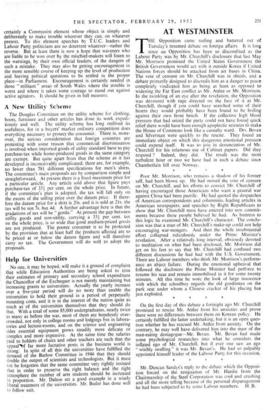AT WESTMINSTER
THE Qpposition came reeling and battered out of Tuesday's resumed debate on foreign affairs. It is long since an Opposition has been so discomfited as the Labour Party was by Mr. Churchill's disclosure that last May Mr. Morrison promised the United States Government the British Government would act with it outside Korea if United Nations forces should be attacked from air bases in China. The vote of censure on Mr. Churchill was in shreds, and a debate primarily designed to discredit him as a danger to peace completely vindicated him as being at least as opposed to widening the Far East conflict as Mr. Attlee or Mr. Morrison. In the twinkling of an eye after the revelation, the Opposition was devoured with rage directed on the face of it at Mr. Churchill, though if you could have searched some of their hearts they would probably have been found to be boiling against their own front bench. If the collective high blood pressure that had seized the party could not have found quick relief there would have been enough apoplectic seizures tO make the House of Commons look like a casualty ward. Drs. Bevan and Silverman were quickly to the rescue. They found an immediate object on which this dangerous emotional pressure could expend itself. It was to join in denunciation of Mr. Churchill for his infamous use of Cabinet papers. Did they respond ? Indeed, they did. The result was the most turbulent hour or two we have had in such a debate since Chamberlain fell over Norway.
Poor Mr. Morrison, who remains a shadow of his former self, had been blown up. He had moved the vote of censure on Mr. Churchill, and his efforts to convict Mr. Churchill of having encouraged those Americans who want a general war against China had been puerile. He had quoted the despatches of American correspondents and columnists, leading articles in American newspapers, and speeches by Right Republicans to show that Mr. Churchill must have entered into new commit- ments because these people believed he had. As buttress to this logic he examined Mr. Churchill's character. The conclu- sion was that a man of Mr. Churchill's make-up could not help encouraging war-mongers. And then the whole insubstantial effort collapsed ridiculously under the Prime Minister's revelation. After a relatively, long interval, obviously devoted to meditation on what had been disclosed, Mr. Morrison did get on his feet to say that Mr. Churchill had confused two different discussions he had had with the U.S. Government. There are Labour members who think Mr. Morrison's perform- ance an abject failure. During the emotional upheaval that followed the disclosure the Prime Minister had perforce to resume his seat and remain immobilised in it for some twenty minutes. All this time he wore the look of large innocence with which the schoolboy regards the old gentleman on the park seat under whom a Chinese cracker of his placing has just exploded.
On the first day of this debate a fortnight ago Mr. Churchill promised to rescue Mr. Attlee from his anxieties and prove there were no differences between them on Korean policy. He certainly fulfilled the latter undertaking, but it is an open ques- tion whether he has rescued Mr. Attlee from anxiety. On the contrary, he may well have delivered him into the maw of the man-eating demagogue—Mr. Bevan. Mr. Bevan had made some psychological researches into what he considers the inflated ego of Mr. Churchill, but if ever one saw an ego " wisibly swelling" it was Mr. Bevan's. He had so palpably appointed himself leader of the Labour Party for this occasion.
Mr. Duncan Sandy's reply to the debate which the Opposi- tion forced on the resignation of Mr. Hardie from the Chairmanship of the Steel Corporation was cool and crushing and all the more telling because of the personal disparagement he had been subjected to by some Labour members. H. B.


































 Previous page
Previous page